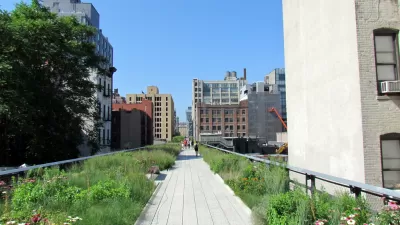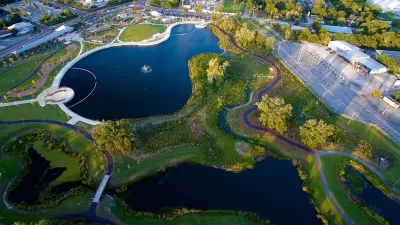In a field that seems divided between aesthetes and the activists, landscape architects may be closest to reconciling the two trends.

In an op-ed, Matt Shaw praises landscape architecture for successfully delivering on social impact as well as design innovation. The rest of the field, Shaw writes, appears split into two camps. "In one camp is a group of architects who work to build new forms, many of whom are divorced from a particular social or political agenda. [...] In the other camp, a group is far less concerned with form-making, and more with attempting to make the world better through design and architecture-related thinking and practice."
Recent landscape projects have included specific environmental and social objectives. From the article: "Landscapes are no longer simply beautiful complements to buildings or vague public social spaces. Designers and clients are activating landscape design to operate environmentally as flood barriers and water remediation zones, among other goals."
Shaw also praises landscape designers for incorporating the latest digital tools into their process. "While landscapes are growing in size and scale, technology is being implemented successfully to plan and execute bold new landscape forms, such as the green swoops and concrete curves of Brooklyn Bridge Park and the High Line."
FULL STORY: Editorial: Landscape Operations

Planetizen Federal Action Tracker
A weekly monitor of how Trump’s orders and actions are impacting planners and planning in America.

Maui's Vacation Rental Debate Turns Ugly
Verbal attacks, misinformation campaigns and fistfights plague a high-stakes debate to convert thousands of vacation rentals into long-term housing.

Restaurant Patios Were a Pandemic Win — Why Were They so Hard to Keep?
Social distancing requirements and changes in travel patterns prompted cities to pilot new uses for street and sidewalk space. Then it got complicated.

Charlottesville Temporarily Has No Zoning Code
A judge ordered the Virginia city to throw out its newly revised zoning code, leaving permitting for new development in legal limbo.

In California Battle of Housing vs. Environment, Housing Just Won
A new state law significantly limits the power of CEQA, an environmental review law that served as a powerful tool for blocking new development.

Boulder Eliminates Parking Minimums Citywide
Officials estimate the cost of building a single underground parking space at up to $100,000.
Urban Design for Planners 1: Software Tools
This six-course series explores essential urban design concepts using open source software and equips planners with the tools they need to participate fully in the urban design process.
Planning for Universal Design
Learn the tools for implementing Universal Design in planning regulations.
Heyer Gruel & Associates PA
JM Goldson LLC
Custer County Colorado
City of Camden Redevelopment Agency
City of Astoria
Transportation Research & Education Center (TREC) at Portland State University
Jefferson Parish Government
Camden Redevelopment Agency
City of Claremont




























